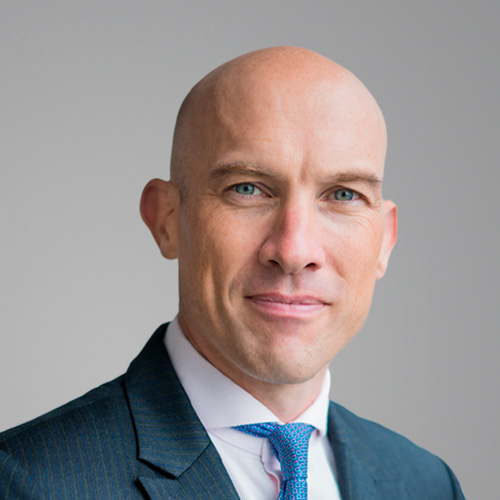Asian Private Banker (19.01.2022) - After overseeing a more than doubling of Union Bancaire Privée’s (UBP) AUM in Asia over the last five years, Michael Blake is targeting discretionary portfolio management (DPM), private markets and China onshore for the next phase of growth at the Swiss pure-play.
UBP, whose bread and butter is serving UHNWIs and family offices from its offshore hubs in Singapore and Hong Kong, grew its assets across its wealth and asset management businesses in Asia to more than US$33billion in 2021. That was despite volatility rocking Asian markets, ranging from a meltdown in the high-yield bonds to a regulatory crackdown in China’s technology sector.
“What was important for me last year was that we maintained our growth trajectory,” Blake, UBP’s Asia CEO, told Asian Private Banker. In terms of net new money in Asia, the bank took in inflows of around 5-10%of its overall asset base during the year. “We would hope to continue growing at a similar magnitude.”
Making clients touch and feel DPM
Priorities for Blake have included solidifying the bank’s position among clients that have invested US$10 million-plus, which account for 80% of AUM and 70% of revenues in the region, and converting more of them to DPM solutions.
“We doubled the number of DPM clients to around one-third of our client base,” said Blake, who became CEO of UBP in Asia following its acquisition of Coutts’ international business in 2016.
Market volatility may have encouraged re-allocation from self-managed portfolios, Blake admitted, but UBP has also introduced products designed to encourage clients to dip their toes into DPM. A unitised DPM offering via a subscription to fund structure — which gives clients the benefits of an actively-managed strategy without having to sign up to an individual mandate — was introduced last year. “That was something that resonated with clients and led to a large increase in the number of them subscribing,” Blake said, who declined to give a minimum investment figure for the new DPM structure.
The UBP Asia CEO is optimistic that the bank can make similar gains in terms of DPM penetration in 2022, adding that his strategy is to get clients to start with a small allocation and then build on that.
“It’s crucial that all of our clients have some asset allocation to DPM,” he believes. “It can be a tiny proportion to start with but we want them to touch and feel the process, so it gives them confidence about other investment decisions that we take for them over the course of managing their portfolios.”
Push into private markets
For Blake, boosting UBP’s private market capabilities is another priority, due to the ultra-low yield environment facing investors.
Globally, UBP has about US$3.5 billion in client assets deployed into private market strategies. In Asia, commitments to such strategies rose by about 30% last year in terms of client assets, while about a third of UBP clients who are eligible to invest in the asset class have an allocation. Eligibility is based on clients having a minimum of US$10 million in assets with UBP and the highest risk profile according to the bank’s internal assessment.
The bank’s private markets proposition has evolved over the last two to three years. While UBP has previously focused on sourcing deals for clients in the property sector, it has transitioned to offering more products in private debt and pre-IPO investments. The company is in the process of adding private equity capabilities, which Blake expects to go live in the first half of 2022. While tight-lipped on specific strategies, he points out that the firm will focus on “bespoke private equity mandates that will appeal to larger family offices in Asia” that can draw on the strength of UBP’s expertise in markets such as Europe and the US.
“There are a number of large, bulge bracket private equity firms that a lot of large families are able to get access to and, frankly, they don’t need us to get access to those kinds of deals,” Blake reckoned. “They’re looking for harder to access, niche strategies that meet their investment objectives.”
Golden opportunity
UBP’s business in Asia has traditionally focused on serving clients in Greater China, Singapore, Philippines, Indonesia, Thailand, Malaysia and non-resident Indians out of booking centres in Singapore and Hong Kong. But for Blake, China’s vast onshore wealth market provides a tantalising future prospect.
“In China at the moment, there is a golden opportunity to develop wealth management,” he believes. “I think we have now reached the stage where it is obvious that there is increased demand from mainland [China] clients for domestic wealth management.”
In September, UBP hired Wang Chao as its head of wealth management for China. Shanghai-based Wang previously ran the HNW/UHNW business at Taikang Insurance and ChangAn Trust.
Blake explained that expanding its “small, exploratory team” in China is one of his main priorities for 2022. “We are in a position to move quite quickly,” he believes. UBP’s strategy in onshore China would likely build on the bank’s ability to offer international strategies to Chinese clients through its Qualified Domestic Limited Partnership licence as a first step in building a broader presence in mainland China.
In terms of onshore clients, Blake believes the family office segment is “hugely interesting” and is “one area where we can potentially help a large number of people in China with knowledge-sharing and other services”.
However, serving Chinese clients offshore will remain a significant focus for UBP. In this regard, Singapore as a hub for Greater China wealth is taking on greater prominence. “We have some coverage at the moment but we’d like to augment that,” according to Blake.
Broadly speaking, Singapore’s status as a hub for Chinese wealth has been boosted by mainland Chinese entrepreneurs and businesses setting up in the city. The Lion City is where UBP books the majority of its assets in Asia, and Blake added that about half of the lender’s private banker hires in the region this year will be those that focus on Greater China wealth in Singapore and Hong Kong.
“Greater China continues to be a great driver of growth both in terms of net new money and in terms of revenue across the business,” said Blake. “So I think it’s a natural step for us to take.”









